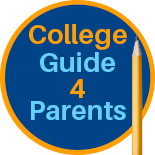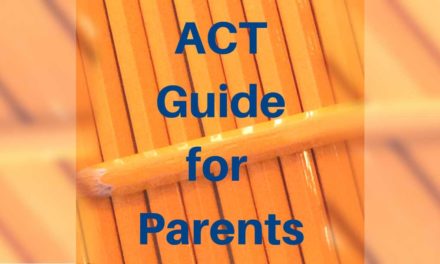The October issue of College Guide 4 Parents’ College Application News informs parents of high school students about college app topics relevant for this time of the year.
This month, seniors are busy working on their applications and making sure colleges get their best test scores.
In this newsletter, we focus on:
- what are ACT composite scores, ACT superscores, and test-flexible colleges
- how to send ACT scores
- what seniors should be working on this month,
- what to write about in a college essay (this section is addressed primarily to parents of freshmen, sophomores, and juniors).
1. ACT COMPOSITE SCORE, ACT SUPERSCORE, AND TEST-FLEXIBLE COLLEGES
ACT composite score
The ACT consists of 4 sections each graded on 36: English, Math, Reading, and Science. The composite score is computed by taking the average of all four grades.
NOTE: Colleges requiring your child’s composite score need to receive his/her best score before the application deadline (see section 2 below for how to send scores).
ACT superscore
Some colleges compute a student’s supercore. This means that they take the average of a student’s best individual English, Math, Reading, and Science scores even if the student obtained them on different test dates. Given that the difficulty of the ACT sections varies from date to date, students’ superscores are usually at least one point higher than their highest composite score.
NOTE: For these colleges, your child will most likely need to send in more than one ACT score. Indeed to compute the supercore, schools need to receive ACT scores for each of the dates at which your child got his/her highest English, Math, Reading and Science score (see section 2 below for how to send scores).
Test-flexible colleges
A growing number of colleges no longer require students to turn in ACT or SAT scores and instead, assess a student’s strengths using scores on AP/IB/SAT Subject tests, additional writings, a portfolio, or evidence of independent research.
Requirements change from school to school, so be sure to read the rules set by each carefully. For example, some colleges make the ACT optional only for students having a GPA of at least 3.5.
Related online resources:
Colleges that superscore the ACT: a complete list by PrepScholar
20 top colleges that are flexible with test scores by US News
List of 1000 schools that are test-optional or test-flexible by FairTest
Everything you need to know about test-optional admissions by CollegeTransitions
2. HOW TO SEND ACT SCORES
There are two ways to send scores to colleges:
- from the act.org website
All of your child’s ACT scores are stored in her/his account on the act.org website. She/he can select a score and put in an order for it to be sent to the college of her/his choice. Each order costs $13.00.
- during the registration process
While registering for the ACT, your child will have the option to select up to six schools to which ACT, inc. will send her/his score once it is available. Sending to the first four colleges is free. It costs $13.00 per school afterward.
Related online resources:
This post by PrepScholar provides more details about these two methods and discusses related topics like “should scores be sent early?” and “when should colleges receive one’s score?”
3. COLLEGE APPLICATION NEWS – WHAT TO DO THIS MONTH
Students applying for Early Action or Early Decision
This month, seniors applying for Early Action or Early Decision are wrapping up their applications. If your child is in this situation, do make sure that the colleges she/he selected receive the referees’ letters of recommendation and her/his highest ACT score before the deadline, typically November 1 or 15 (see section 2 of this newsletter for how to send scores).
Students applying for Regular Decision
Those applying for Regular Decision have a few more months to put their applications together and may not have started yet. Entering data in an online college application takes time and planning. The good news is that your child does not need to do it all in one sitting. The student can work on a section, save the work done, and come back to it later.
Applications typically include the following sections:
- general information about the student and his/her family
student’s name, birth date, birthplace, address, contact information, demographics, and language(s) spoken
- educational information
high school(s) attended, high school GPA, the list of courses taken in 12th grade and honors/awards received since 9th grade (the Common App accepts up to 5)
- self-reported scores
the student can choose to report scores he/she got on other standardized tests like AB, IB, ACT, and SAT tests
- extracurricular activities
the student can report his/her most significant involvement in school clubs, sports, scouts, volunteering, employment, or any other extracurriculars. The Common App accepts up to 10 activities.
- personal essay(s)
NOTE: Students must make sure colleges receive the required letters of recommendation, and their highest ACT/SAT score before the deadline.
Related online resources:
Important college admission deadlines you can’t miss by PrepScholar
An in-depth discussion of what are Regular Decision, Early Action, Early Decision, and Rolling Admissions.
Creating a parent’s account to get full access to the 2018-19 Common Application on commonapp.org
The Common Application allows parents to create a practice account where they can enter any information just like an actual student. These users can enter and save information but cannot submit the application. This is an excellent way for you to get a feel for what your child is expected to do and how the application is structured.
4. FEATURE OF THE MONTH: WHAT TO WRITE ABOUT IN A COLLEGE ESSAY
For parents of seniors
If your child is a senior, check our post 2018-19 College essay advice: 82 posts by college prep experts. In these 82 articles, PrepScholar, CollegeVine, and CollegeXpress provide tips and guidelines on how to approach essay prompts specific to 62 colleges.
For instance, your child will get guidelines on how to answer:
- the University of Chicago‘s essay prompt
Essay Option 2: You’re on a voyage in the thirteenth century, sailing across the tempestuous seas. What if, suddenly, you fell off the edge of the Earth?
- or the Baylor University‘s supplemental essay
What are you looking for in a university, why do you want to attend Baylor University, and how do you see yourself contributing to the Baylor community? (supplemental)
For parents of high school freshmen, sophomores, and juniors
If your child is not yet a senior, you may wonder if there is anything he/she can do right now that will help him/her when comes the time to write the essay.
What colleges expect
While most of the information seniors provide in their application documents their academic success (ACT/SAT score, GPA, and courses taken), admission officers are also interested in knowing about a student’s character and aspirations. This will help them decide whether he/she would be a good fit or an asset to their school.Letters of recommendation provide a glimpse into your child’s personality from an outsider’s perspective. The essay, however, is the place where students get to explain in their own words who they areand what they want to achieve while in college and beyond.
Most college essay prompts are variations of a few common themes. Here are the seven prompts for the 2018-19 Common Application:
1. Some students have a background, identity, interest, or talent that is so meaningful they believe their application would be incomplete without it. If this sounds like you, then please share your story.
2. The lessons we take from obstacles we encounter can be fundamental to later success. Recount an incident or time when you faced a challenge, setback, or failure. How did it affect you, and what did you learn from the experience?
3. Reflect on a time when you questioned a belief or idea. What prompted your thinking? What was the outcome?
4. Describe a problem you’ve solved or a problem you’d like to solve. It can be an intellectual challenge, a research query, an ethical dilemma-anything that is of personal importance, no matter the scale. Explain its significance to you and what steps you took or could be taken to identify a solution.
5. Discuss an accomplishment, event, or realization that sparked a period of personal growth and a new understanding of yourself or others.
6. Describe a topic, idea, or concept you find so engaging that it makes you lose all track of time. Why does it captivate you? What or who do you turn to when you want to learn more?
7. Share an essay on any topic of your choice. It can be one you’ve already written, one that responds to a different prompt, or one of your own design.
These questions will give your child opportunities to let his/her personality shine through. For instance, he/she will get to describe a talent or a passion, or explain how he/she solved a problem or changed as a result of a challenging experience.
How extracurricular activities will help
A student who is involved solely in his/her studies will not have much to talk about. On the other hand, teenagers involved in extracurricular activities have a treasure trove of stories from which to draw.
Belonging to a school club, joining a school sports team, attending camps, being a scout, volunteering, job shadowing or holding a job will open your child’s world. He/she will get to meet many different people, learn various new skills, and take on leadership roles.
As members of school clubs, students meet other students, volunteer at local agencies, and, in some cases, participate in competitions.
Summer camps offered by universities acquaint students with the academic environment and give them an idea of what it would be like to go to college. Some of these camps introduce their participants to fields like engineering, computer science, and architecture. Such opportunities could help your child decide which major he/she will choose once in senior year.
Volunteering and job shadowing are great ways that expose high schoolers to various professions and can help them decide on a career.
Getting involved in a few of these extracurricular activities will provide your child with a multitude of anecdotes he/she will be able to recount in his/her college essays.
5. PREVIOUS COLLEGE GUIDE 4 PARENTS’ COLLEGE APPLICATION NEWS AND RELATED POSTS
September 2018 College App News – PSAT, ACT, Early Action, Early Decision
2018-19 College essay advice: 82 posts by college prep experts
6. REQUEST FOR COMMENTS
If this information were of help to you or if there are topics you would like me to address, please leave a comment.





